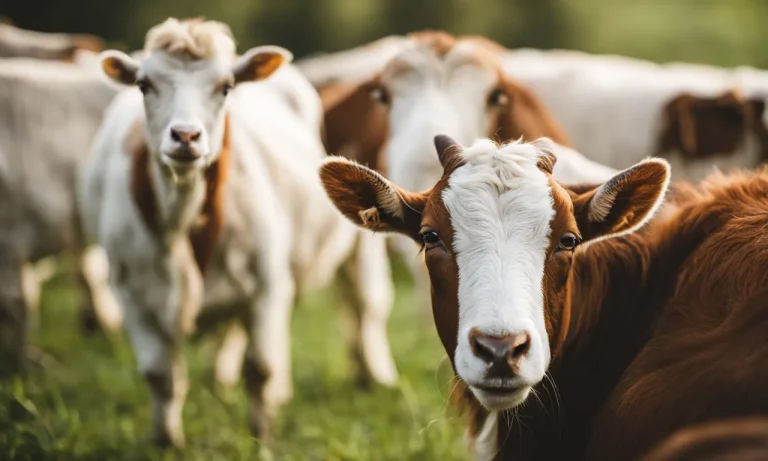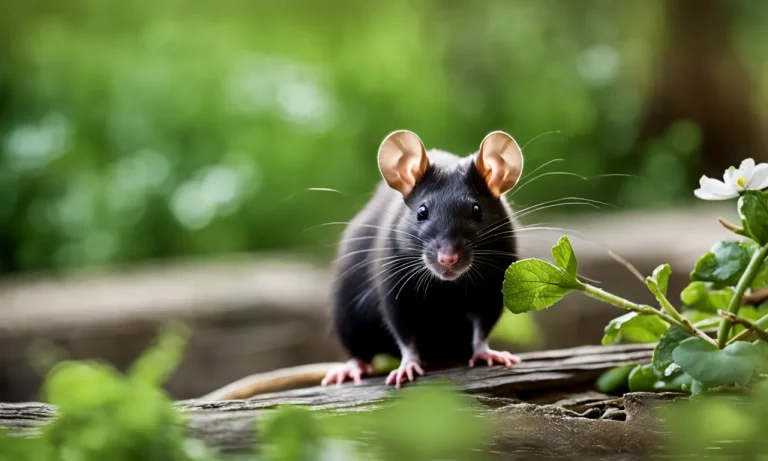Rabbits are known for being skittish creatures who bolt at the slightest sign of danger. So if you’ve ever come across a wild rabbit that sticks around instead of hopping away when you approach, you may be wondering why it’s not following its natural instincts to flee.
If you’re short on time, here’s a quick answer to your question: Wild rabbits may not run away if they’re sick, injured, or orphaned, which makes them vulnerable. They could also be used to humans if they live in an area like a park. Some rabbits are simply bolder than others genetically.
In this article, we’ll explore the main reasons a wild rabbit might not run away when you try to get near it. We’ll look at issues like illness, injury, and habituation to humans as well as territorial behavior and bold personality.
Understanding rabbit psychology and natural history will shed light on this unusual phenomenon.
It’s Sick or Injured and Vulnerable
When you come across a wild rabbit that doesn’t run away, it is likely because it is sick or injured. Rabbits are prey animals, and their instinct is to flee from potential danger. However, when a rabbit is not able to escape, it could be a sign that something is wrong with it.
Signs of Illness or Injury
There are several signs that can indicate a wild rabbit is sick or injured. These include:
- Limping or difficulty moving
- Visible wounds or open sores
- Discharge from the eyes or nose
- Labored breathing or coughing
- Unusual behavior, such as lethargy or lack of appetite
If you notice any of these signs, it is important to contact a local wildlife rehabilitator or veterinarian for assistance. They will be able to assess the rabbit’s condition and provide appropriate care.
Diseases like Myxomatosis
One common disease that can affect wild rabbits is myxomatosis. This viral infection causes swelling and discharge around the eyes, nose, and genitals, making it difficult for rabbits to see, eat, and reproduce.
Myxomatosis is often spread by fleas and mosquitoes, and it can have a high mortality rate among infected rabbits.
If you suspect that a wild rabbit has myxomatosis, it is best to contact a wildlife professional who can provide guidance on how to handle the situation. They may recommend euthanizing the rabbit to prevent the spread of the disease to other rabbits in the area.
Parasites
Parasites, such as fleas, ticks, and mites, can also cause discomfort and illness in wild rabbits. These external parasites can lead to skin irritation, hair loss, anemia, and even transmit diseases. Additionally, rabbits can also be infested with internal parasites like worms or coccidia, which can cause digestive issues and weight loss.
If you come across a wild rabbit with signs of parasite infestation, it is important to contact a wildlife rehabilitator or veterinarian. They will be able to provide appropriate treatment to alleviate the rabbit’s suffering and prevent the parasites from spreading.
Broken Bones or Open Wounds
Another reason why a wild rabbit may not run away is if it has suffered a broken bone or has open wounds. These injuries can be caused by predators, accidents, or even human interference. Rabbits with broken bones or open wounds are unable to move quickly and may seek shelter in an attempt to protect themselves.
If you encounter a wild rabbit with obvious injuries, it is crucial to seek help from a wildlife rehabilitator or veterinarian. They will be able to assess the extent of the injuries and provide necessary treatment, such as splinting broken bones or cleaning and suturing wounds.
Remember, wild rabbits are wild animals and should not be handled or approached without proper training and authorization. If you encounter a wild rabbit that appears sick or injured, it is best to contact a wildlife professional who can provide the necessary care and support.
It’s an Orphaned Baby Rabbit
Have you ever come across a wild rabbit that doesn’t run away when approached? There could be several reasons why this might be the case, and one of them is that the rabbit is an orphaned baby. Let’s take a closer look at the possible reasons behind this behavior.
Nest Disturbance by Predators or Humans
One reason why a baby rabbit might be orphaned is due to nest disturbance. Predators such as foxes, cats, or birds of prey may have discovered the nest and attacked the mother rabbit, leaving the baby rabbit defenseless.
Similarly, humans unknowingly disturbing rabbit nests can lead to the mother rabbit abandoning her young ones. It’s important to be mindful of rabbit nests and avoid disturbing them whenever possible.
Abandonment by Mother
In some cases, the mother rabbit may abandon her young ones for various reasons. This could be due to stress, illness, or a lack of resources to properly care for her offspring. When a baby rabbit is left without its mother, it may become more reliant on humans for survival, which could explain why it doesn’t run away when approached.
However, it’s important to remember that wild rabbits are best left in their natural habitat whenever possible.
Lack of Fear Imprinting
Another reason why a baby rabbit might not run away is a lack of fear imprinting. Fear imprinting is a crucial behavior that helps wild animals identify and avoid potential threats. When a baby rabbit doesn’t have the opportunity to learn from its mother or other rabbits in its surroundings, it may not develop the necessary fear response.
This can result in the rabbit not recognizing humans as potential predators and therefore not running away.
It’s worth noting that while an orphaned baby rabbit may not run away, it doesn’t necessarily mean it’s safe or healthy. If you come across a baby rabbit that appears to be orphaned, it’s best to contact a local wildlife rehabilitation center for guidance on how to best assist the rabbit.
It’s Habituated to Humans
One of the main reasons why wild rabbits don’t run away from humans is because they have become habituated to their presence. Habituation occurs when an animal becomes accustomed to a stimulus, in this case, humans.
Rabbits that live in parks or populated areas are frequently exposed to people, which gradually reduces their fear response.
Frequent Exposure in Parks or Populated Areas
Wild rabbits that live in parks or populated areas are constantly exposed to humans. They see people walking, running, and picnicking, which becomes a regular part of their environment. Over time, they become desensitized to human presence and may even associate people with sources of food and safety.
Being Fed by People
Another factor that contributes to habituation is when wild rabbits are fed by people. Some individuals enjoy feeding wildlife, including rabbits, with carrots or lettuce. When rabbits receive regular meals from humans, they start to associate humans with a source of food.
This association further reduces their fear and increases their tolerance towards human presence.
Losing Their Fear Over Time
Rabbits are naturally cautious animals and have a strong instinct to flee from potential threats. However, when they are exposed to humans without any harm or danger, they begin to lose their fear over time.
As they realize that humans pose no immediate threat, they become more comfortable and less likely to run away.
It’s Territorial and Staying Put
Wild rabbits are known for their cautious and skittish nature, often darting away at the slightest hint of danger. However, there are instances where you may come across a wild rabbit that seems unfazed by your presence and chooses to stay put. There are a few reasons why this might occur.
Guarding Its Home Territory
One reason why a wild rabbit may not run away is because it is guarding its home territory. Rabbits are territorial animals and mark their territory with scent glands located on their chin and near their anus.
By staying put, the rabbit is sending a clear message to other rabbits that this area is already claimed. It’s a way for the rabbit to assert dominance and protect its resources, such as food and shelter.
Mother Rabbit Protecting Kittens
Another reason why a wild rabbit may stay put is if it is a mother rabbit protecting her kittens. Female rabbits, or does, create nests in hidden locations to give birth and raise their young. During this time, the mother rabbit will often stay close to the nest to keep her kittens safe from predators.
She may choose to remain still and quiet to avoid drawing attention to the nest and the vulnerable young rabbits.
Bold and Dominant Personality
Some wild rabbits simply have a bolder and more dominant personality compared to others. Just like humans, rabbits have unique personalities that can vary from individual to individual. While most rabbits are naturally shy and prone to flee, there are a few bold and confident rabbits who are less likely to run away.
These rabbits are more inclined to hold their ground and may even approach humans out of curiosity.
It’s important to note that while a wild rabbit may appear calm and unafraid, it is still a wild animal and should be treated with caution and respect. It’s best to observe from a distance and avoid any sudden movements or actions that may startle or stress the rabbit.
It Has a Bold Personality
One of the reasons why this wild rabbit doesn’t run away is because it has a bold personality. Unlike other rabbits that may be timid and cautious, this particular rabbit exhibits a fearless and adventurous nature.
Variable Fear Response in Rabbits
Rabbits, like many other animals, have varying fear responses. While some rabbits may be quick to flee at the slightest sign of danger, others may be more inclined to stay and assess the situation. This can be attributed to a combination of genetics, upbringing, and individual personality traits.
Research has shown that certain rabbits have a higher threshold for fear and are less easily startled. They may have a more laid-back approach to life and feel more comfortable in their surroundings. This boldness can be seen in their interactions with humans and other animals, as they may not shy away or run away as quickly as their more cautious counterparts.
Bolder Rabbits Explore New Things
Another characteristic of rabbits with a bold personality is their curiosity and willingness to explore new things. These rabbits are not afraid to venture into unfamiliar territory, whether it be exploring a new part of their habitat or investigating new objects in their environment.
This boldness and curiosity can be seen in their behavior, as they may approach and investigate objects or people that other rabbits would shy away from. This can make them appear more friendly and sociable, as they are more open to interactions and experiences.
Less Reactive to Stress
Rabbits with a bold personality also tend to be less reactive to stress. They may not show the same level of anxiety or fear in stressful situations as more timid rabbits do. This can be beneficial for their overall well-being, as chronic stress can have negative effects on an animal’s health.
Studies have shown that rabbits with a bold personality have lower levels of stress hormones compared to their more timid counterparts. This resilience may be attributed to their confident and relaxed nature, allowing them to better cope with and adapt to challenging situations.
Conclusion
While running away is a typical survival strategy for rabbits in the wild, there are a range of reasons why one may surprisingly stick around when you approach it. By understanding the circumstances like injury, habituation to humans, territoriality, and bold personality, you can better comprehend this unusual rabbit behavior.
If you come across a rabbit that doesn’t hop away, be sure not to chase or handle it. Observe from a distance and contact wildlife authorities if you have concerns over its wellbeing. With a little insight into the rabbit’s perspective, you can appreciate the individual differences that make each one unique.






